2014-15 bucknell
You may have noticed, especially during the second half of Monday's thumping of Bucknell, that Michigan's offense has looked a little different this season. This season's shot chart, via Shot Analytics, puts it in picture form (green dots are makes, red misses):
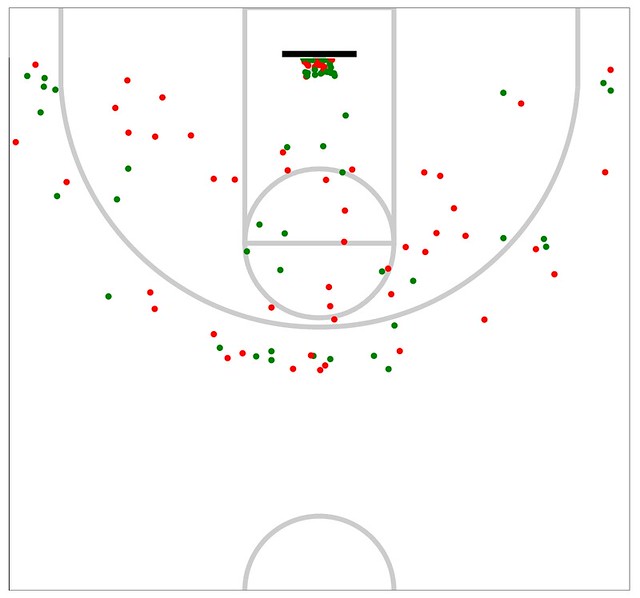
A little over 34% of Michigan's shots this season have come from midrange, compared to just over 25% last season. It's not a good change, either; midrange jumpers are by nature the game's most inefficient, and the Wolverines are hitting just 33% of such shots this season, down from 39% in 2013-14. A higher volume and lower efficiency is obviously not a good thing.
A closer look reveals that there may be something here worth sticking with, however. With the usual sample size caveats applying, here's a simple breakdown of what's working and what's not:
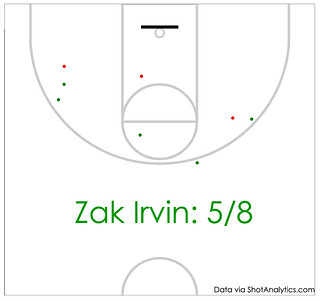
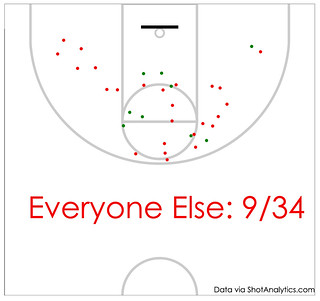
(If you're wondering why it looks like a three is included in Irvin's chart, he had a foot on the line.)
Simply put, Zak Irvin is working, and a look at the tape reveals that this may be no fluke, especially since Irvin wasn't bad on midrange elbow jumpers last season (8/19). Here are all of Irvin's midrange attempts from this season:
He's getting these shots primarily in two ways: catch-and-shoot jumpers (3/3) and step-ins when defenders overplay his outside shot (2/4). The aborted drive to the rim off a curl-cut stands as the exception, not the rule.
[Hit THE JUMP for a look at why the rest of the team isn't shooting like Irvin, as well as a picture pages of how M is getting Irvin good midrange looks.]
11/17/2014 – Michigan 77, Bucknell 53 – 2-0
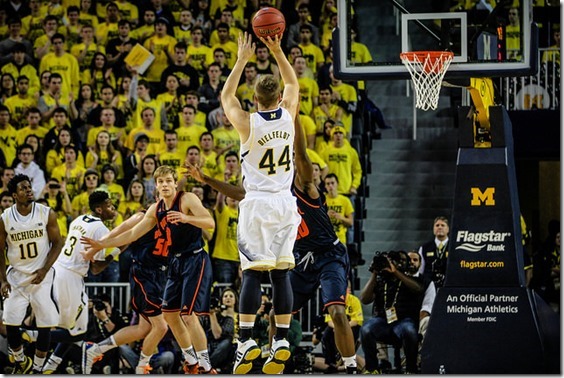
then he served Bucknell pancakes [Eric Upchurch]
That was rather impressive. The Bison are not a SWAC pushover. Historically they're one of the best teams in the Patriot League, and while they fell off a bit last year they were still good enough to put scares into Stanford and St. John's and beat Penn State by ten.
Michigan blew 'em off the court, opening up a 48-19 halftime lead and coasting from there.
We never think of the Kenpom. Speaking of the coasting: it got sloppy in the second half, with Michigan settling for a ton of long twos off the dribble with 25 seconds on the shot clock. These went clang, as dictated by Karma, and the blistering hot start petered out into a less than blistering 1.15 points per possession.
Broken record time: I don't mind open jumpers taken in rhythm, especially after you've gotten past a guy on a closeout and know you've got space to elevate without being harassed. I really do not like low-efficiency long twos that come without exploring your possession for better shots. There's a reason you can get those whenever you want. It's hard to yell at guys when you're hammering the opposition, but hopefully that's one of them coaching points that can be deployed.
THE CALVES THAT ATE THE AMERICAN WEST. So… remember that time someone asked why Max Bielfeldt keeps taking threes and Beilein responded that he was an assassin in practice? I guess that's accurate. On a night where one of the Big Three was struggling with his shot and Michigan got little production out of the four spot, Bielfeldt laid waste to the Bison. He hit all three of his attempts behind the arc and scoring 18 on 10 shot equivalents. Max was a one-man Manifest Destiny out there.
Does this mean something going forward? Maybe. Bielfeldt is still way undersized for the 5 spot in the Big Ten, and in this game there were a couple of post buckets by the spectacularly-named Nana Fouland that Bielfeldt could barely contest.
But maybe the four would work? If Bielfeldt is a credible threat in the corner and the matchup doesn't seriously expose him defensively that could be an option, Kenny Kaminski style. Bielfeldt is a decent matchup against Brandon Dawson types who aren't going to blaze by him to the basket, and Michigan's not getting much production out of that spot.
I still don't think you can build a Big Ten defense around a 6'7" post.
[After THE JUMP: rebounding strategy, HULK SMASH, Irvin "not bad" face.]
[Eric Upchurch/MGoBlog]
MAX BI3LF3LDT
An externality of Michigan’s ascent has been its ability to simply run overmatched non-conference opponents out of the beautiful Crisler Center. Bucknell has been a solid mid-major program for a few years now and their kenpom rank entering the night (177) suggested that they may be game for a fight. That notion was quickly disproved after Michigan ran out to an early 10-0 lead, capped by a three-pointer from little-used reserve Max Bielfeldt. The rest of the first half was much of the same: Michigan led 10-2 at the under-16 timeout, 24-7 at the under-12, 34-13 at the under-8, 41-17 at the under-4, and 48-19 at halftime.
With the game’s outcome fairly secure, the story quickly became about Bielfeldt – the veteran had yet to make a significant contribution in his time at Michigan and many (including myself) projected that three freshmen would be above him on the depth chart. It was a surprise to see Bielfeldt replace Mark Donnal as the first big man off of the bench, but—as usual—John Beilein made a wise decision in playing the senior center.
In Bielfeldt’s first four minutes on the court, he made two three-pointers (both assisted by Kam Chatman) and was the beneficiary of an excellent drive-and-dish from Spike Albrecht; those eight points doubled his previous career high. He finished with 18 points total on an efficient 7-9 shooting and made each of his three-point attempts. With Michigan’s impressive cadre of lethal offensive weapons, it’s hard to imagine that Bielfeldt was scouted much by the Bison, but Bielfeldt was outstanding. In the end, he finished second on the team in scoring (behind Zak Irvin’s 23 points) and looks like he’s another factor in Michigan’s uncertain hierarchy of big men.
Irvin got his points efficiently – 23 points on 8-13 shooting (4-5 from three) – and seemingly scored at will. His characteristic quick-trigger was on full display, though he did also have a nice assist to Mark Donnal on a screen-and-roll action and had a nice take in transition. Derrick Walton chipped in with 15 points, managed to pull down 8 rebounds, and was extremely aggressive in transition.
The third member of Michigan’s high-octane triumvirate, Caris LeVert, was notably quiet, though his production wasn’t needed. LeVert was 2-11 from the field and eventually just managed 6 points on the night (along with 6 rebounds and 6 assists). Spike Albrecht didn’t shoot well (1-5) but did have six assists; he was so masterful with the ball in his hands and it seemed like he was able to do whatever he liked against the Bison defense.
Beilein did give minutes to six freshmen and they were variably effective: Mark Donnal got the start but was quiet (though he did have two blocks); Ricky Doyle had a few nice post moves; Kam Chatman had a few opportunistic steals on defense but conceded a few open looks because of his inexperience, while contributing little offensively; D.J. Wilson looked a little bit lost on offense and didn’t play much until garbage time; Muhammad Ali Abdur-Rahkman got a little run in the first half but didn’t do much; Aubrey Dawkins was relegated to mop-up duty at the end of the night.
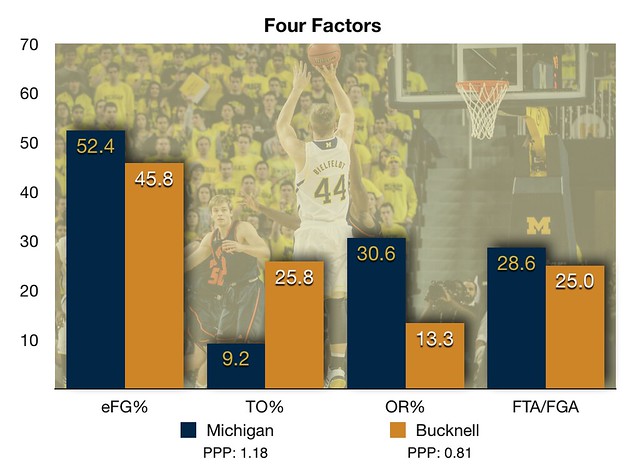
Graphic from Ace Anbender
Michigan just overwhelmed Bucknell from the opening tip. The Wolverines’ shooting regressed to the mean in the second half and Bucknell’s numbers were bolstered by a flurry of late, inconsequential threes from Chris Hass. Michigan’s defense—normally not known for its ability to force turnovers—flustered Bucknell in the half-court and the Bison turned the ball over 17 times. With Michigan’s dominance on the offensive glass, it was a comprehensive win.
These types of games tend to blend together over time, but Bielfeldt’s breakout performance, in particular, was very memorable. If he eventually becomes a key cog on this Michigan team, we’ll look back on this game on an unseasonably wintry November weeknight as the catalyst for something bigger.
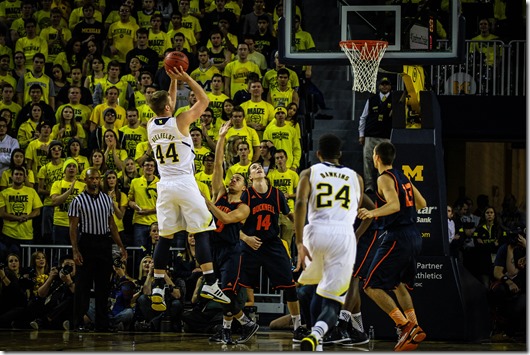
16